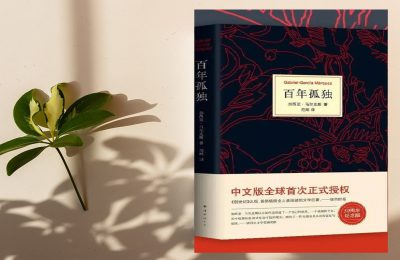《百年孤独》,是哥伦比亚作家加西亚·马尔克斯创作的长篇小说,是其代表作,也是拉丁美洲魔幻现实主义文学的代表作,被誉为“再现拉丁美洲历史社会图景的鸿篇巨著”。故事讲述马孔多小镇和布恩地亚家族的兴衰变化与传奇故事,记录了家族命运与百年历史,是重复地叙述相同而荒唐的命运,是拉美国家几百年命运的缩影,独具意味地隐喻着人类“文明”史的建立、发展与终结,在荒凉失落与荒唐可笑中诠释宿命式的轮回。家族中人物名字是相同或相近的,预示着他们拥有殊途同归的孤独命运。《百年孤独》以布恩地亚被捆在树上为开端,以他被蚂蚁吃掉为结束,通过细腻丰富的笔触、大胆自由的想象、魔幻的叙事艺术,讲述布恩地亚家族命运与历史,刻画人物孤独的灵魂与自我救赎,进而体现出个人、家族及全人类的悲悯与孤独情怀,让人们重新思考时代发展与人性变化。《百年孤独》被世界文坛誉为魔幻现实主义文学的主峰,已被翻译成30多种文字出版,销量逾1000万册。
Chapter 6
COLONEL AURELIANO BUEND?A organized thirty-two armed uprisings and he lost them all. He had seventeen male children by seventeen different women and they were exterminated one after the other on a single night before the oldest one had reached the age of thirty-five. He survived fourteen attempts on his life, seventy-three ambushes, and a firing squad. He lived through a dose of strychnine in his coffee that was enough to kill a horse. He refused the Order of Merit, which the President of the Republic awarded him. He rose to be Commander in Chief of the revolutionary forces, with jurisdiction and command from one border to the other, and the man most feared by the government, but he never let himself be photographed. He declined the lifetime pension offered him after the war and until old age he made his living from the little gold fishes that he manufactured in his workshop in Macondo. Although he always fought at the head of his men, the only wound that he received was the one he gave himself after signing the Treaty of Neerlandia, which put an end to almost twenty years of civil war. He shot himself in the chest with a pistol and the bullet came out through his back without damaging any vital organ. The only thing left of all that was a street that bore his name in Macondo. And yet, as he declared a few years before he died of old age, he had not expected any of that on the dawn he left with his twenty-one men to join the forces of General Victorio Medina.
“We leave Macondo in your care.?was all that he said to Arcadio before leaving. “We leave it to you in good shape, try to have it in better shape when we return.?
Arcadio gave a very personal interpretation to the instructions. He invented a uniform with the braid and epaulets of a marshal, inspired by the prints in one of Melquíades?books, and around his waist he buckled the saber with gold tassels that had belonged to the executed captain. He set up the two artillery pieces at the entrance to town, put uniforms on his former pupils, who had been amused by his fiery proclamations, and let them wander through the streets armed in order to give outsiders an impression of invulnerability. It was a double-edged deception, for the government did not dare attack the place for ten months, but when it did it unleashed such a large force against it that resistance was liquidated in a half hour. From the first day of his rule Arcadio revealed his predilection for decrees. He would read as many as four a day in order to decree and institute everything that came into his head. He imposed obligatory military service for men over eighteen, declared to be public property any animals walking the streets after six in the evening, and made men who were overage wear red armbands. He sequestered Father Nicanor in the parish house under pain of execution and prohibited him from saying mass or ringing the bells unless it was for a Liberal victory. In order that no one would doubt the severity of his aims, he ordered a firing squad organized in the square and had it shoot at a scarecrow. At first no one took him seriously. They were, after all, schoolchildren playing at being grown-ups. But one night, when Arcadio went into Catarino’s store, the trumpeter in the group greeted him with a fanfare that made the customers laugh and Arcadio had him shot for disrespect for the authorities. People who protested were put on bread and water with their ankles in a set of stocks that he had set up in a schoolroom. “You murderer!??rsula would shout at him every time she learned of some new arbitrary act. “When Aureliano finds out he’s going to shoot you and I’ll be the first one to be glad.?But it was of no use. Arcadio continued tightening the tourniquet with unnecessary rigor until he became the cruelest ruler that Macondo had ever known. “Now let them suffer the difference,?Don Apolinar Moscote said on one occasion. “This is the Liberal paradise.?Arcadio found out about it. At the head of a patrol he assaulted the house, destroyed the furniture, flogged the daughters, and dragged out Don Apolinar Moscote. When ?rsula burst into the courtyard of headquarters, after having gone through the town shouting shame and brandishing with rage a pitch-covered whip, Arcadio himself was preparing to give the squad the command to fire.
-1.gif)




